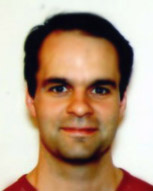|
Walter E. B. Sipe, MD (son of Richard & Marianne Sipe) > website
After completing his undergraduate work at Harvard University, Sipe went to medical school at the University of California, San Diego, where he was awarded an HHMI medical student fellowship. "Working in the lab with Thomas Kipps helped me understand the difference between loving science and being a scientist," Sipe says. "I learned the value of focusing and following through on a single research question. It was a hard lesson, and I mostly learned it through failures. However, now that I'm doing research, I have a better sense of how to be productive." Intrigued by both research and clinical work, Sipe elected a career in academic medicine. "My experience as a resident had a profound impact on my research interests," he explains. "My most challenging patients were young adolescents with severe abdominal pain. Treatment had a predictable progression. Patients would be admitted to the hospital because of the acute pain, but after a thorough workup, nothing would be found. Without a clear diagnosis, families and physicians ended up frustrated. Eventually, a cycle would start—the same patients would appear every month in severe pain, but with no identifiable lesions. "There are many factors contributing to the experience of visceral, or gut, pain: neurologic, hormonal, immunologic, and psychological," he continues. "But functional abdominal pain that occurs without a clear anatomical location is a huge black box for physicians and researchers. Basic research on the specific mechanism of pain is needed to provide these patients with satisfactory treatment options." Sipe currently is conducting research on visceral pain in the laboratory of Nigel Bunnett at the University of California, San Francisco. "We're working on two models," he says. "The cellular model explores how the transient receptor potential vanilloid family of pain receptors is modified by the presence of inflammation. We hope to learn how these receptors may contribute to abdominal pain in the setting of subtle inflammation of the gastrointestinal tract. Our second model looks at mouse behavior and should give us new information on abdominal pain and GI tract distension." Sipe notes that some people find the long dual-training process daunting, but he is enjoying it. "I don't focus on what will happen some day when I have my own lab or practice," he says. "I've seen too many people burn out waiting for that future payoff. My payoff is learning. That makes almost every day enjoyable." Ask a Scientist is part of the enjoyment. "I've been with the program since 1998, and I love answering the questions," he explains. "Invariably I end up clarifying something for myself. It's fun to learn and teach, and I try to convey some of that excitement in my responses." "My advice to students interested in the biosciences," Sipe says, "is to enjoy the process of learning while you are doing it. Make a commitment to enjoying every step." —Joan Guberman 6/06
|
 "I've loved science for as long as I can remember," reminisces Walter Sipe, a pediatric gastroenterologist. "By the time I was a teenager, I knew I wanted to go into medicine because it was the most complete scientific study of the most fascinating of subjects: the human animal. I chose psychology as my undergraduate major to complement the biomedical component of medical school training."
"I've loved science for as long as I can remember," reminisces Walter Sipe, a pediatric gastroenterologist. "By the time I was a teenager, I knew I wanted to go into medicine because it was the most complete scientific study of the most fascinating of subjects: the human animal. I chose psychology as my undergraduate major to complement the biomedical component of medical school training."  NB: Walter was a member of the 2006 Inaugural Class of Hartwell Fellows, Department of Pediatrics. He resigned effective June 2008 to pursue a clinical training opportunity in psychiatry at UCSF
NB: Walter was a member of the 2006 Inaugural Class of Hartwell Fellows, Department of Pediatrics. He resigned effective June 2008 to pursue a clinical training opportunity in psychiatry at UCSF